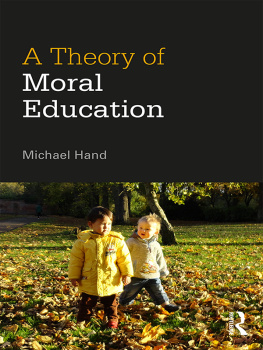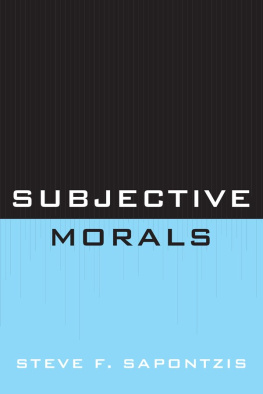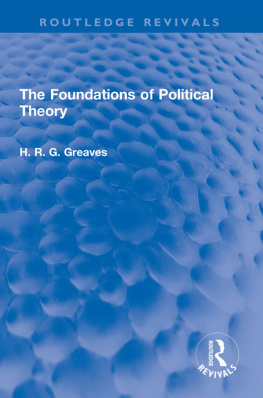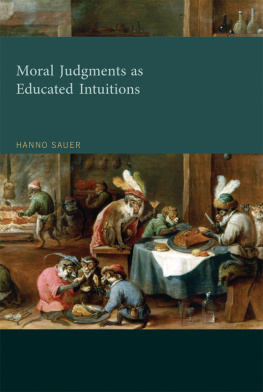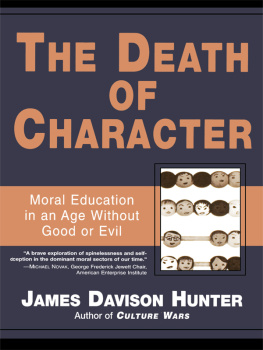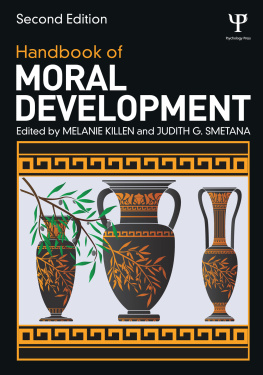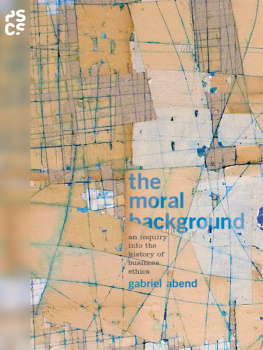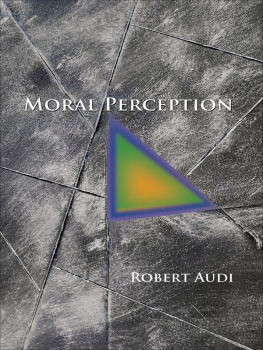Hand has written a book on the deeply difficult problem of moral education that is a marvel of clarity and cogency. He never succumbs to the evasiveness or the dogmatism that almost always undermines writing on this topic. When he takes a stand, you will always understand the reasons why he does so, even if you disagree with him. No recent book on the topic can compare with this one.
Eamonn Callan, Pigott Family Professor of Education, Stanford University, USA
This groundbreaking book should become essential reading for anyone interested in moral education in modern multicultural societies. It is written in a straightforward, direct style, and is packed with careful arguments. Whether or not you agree with Hands arguments, youll come away with a much better understanding of what is at stake. Highly recommended.
Harry Brighouse, Professor of Philosophy, University of Wisconsin-Madison, USA
A THEORY OF MORAL EDUCATION
Children must be taught morality. They must be taught to recognise the authority of moral standards and to understand what makes them authoritative. But theres a problem: the content and justification of morality are matters of reasonable disagreement among reasonable people. This makes it hard to see how educators can secure childrens commitment to moral standards without indoctrinating them.
In A Theory of Moral Education, Michael Hand tackles this problem head on. He sets out to show that moral education can and should be fully rational. It is true that many moral standards and justificatory theories are controversial, and educators have an obligation to teach these nondirectively, with the aim of enabling children to form their own considered views. But reasonable moral disagreement does not go all the way down: some basic moral standards are robustly justified, and these should be taught directively, with the aim of bringing children to recognise and understand their authority.
This is an original and important contribution to the philosophy of moral education, which lays a new theoretical foundation for the urgent practical task of teaching right from wrong.
Michael Hand is Professor of Philosophy of Education at the University of Birmingham, UK.
A THEORY OF MORAL EDUCATION
Michael Hand

First published 2018
by Routledge
2 Park Square, Milton Park, Abingdon, Oxon, OX14 4RN
and by Routledge
711 Third Avenue, New York, NY 10017
Routledge is an imprint of the Taylor & Francis Group, an informa business
2018 Michael Hand
The right of Michael Hand to be identified as author of this work has been asserted by him in accordance with sections 77 and 78 of the Copyright, Designs and Patents Act 1988.
All rights reserved. No part of this book may be reprinted or reproduced or utilised in any form or by any electronic, mechanical, or other means, now known or hereafter invented, including photocopying and recording, or in any information storage or retrieval system, without permission in writing from the publishers.
Trademark notice: Product or corporate names may be trademarks or registered trademarks, and are used only for identification and explanation without intent to infringe.
British Library Cataloguing-in-Publication Data
A catalogue record for this book is available from the British Library
Library of Congress Cataloging in Publication Data
A catalog record for this book has been requested
ISBN: 978-1-138-89853-0 (hbk)
ISBN: 978-1-138-89854-7 (pbk)
ISBN: 978-1-315-70850-8 (ebk)
For Al, Nick and Ed
The theory I present in this book has had a long gestation period. The problem it purports to solve, or at least some inchoate version of the problem, has troubled me since the beginning of my academic career. In my first few published articles I explored the threat of indoctrination in religious education and upbringing (Hand, 2002, 2003, 2004a, 2004b). I argued, and still hold, that to indoctrinate someone is to bring it about that she holds beliefs non-rationally, on some other basis than relevant evidence and argument, and that indoctrination should be avoided by educators. That puts a severe constraint on what is permissible in the domain of religious education and upbringing. But it also has implications for moral education and upbringing, in particular for attempts to impart beliefs about the authority of moral standards.
I first articulated the problem in roughly the form it takes here in a keynote presentation at the 2010 Annual Conference of the Philosophy of Education Society of Great Britain. I did not, at that point, attempt to solve it. The week after that conference I departed for a five-month stint as a visiting scholar at Stanford University, confident that I would return to the UK with a solution to the problem and a draft of this book. Despite illuminating conversations with Eamonn Callan, Rob Reich, Susan Verducci and Michael Katz, and long days in the Green Library chasing promising philosophical leads, I came home, much chastened, with neither.
The project went on hold for a while until, in 2012, I moved from the London Institute of Education to the University of Birmingham and began a three-year affiliation with the Jubilee Centre for Character and Virtues. There, in the stimulating philosophical company of Randall Curren, Ben Kotzee, Kristjan Kristjansson and David Carr, I resumed work on the problem and the argument of this book began to take shape. I first presented the theory, in prototypical form, in my inaugural lecture at Birmingham in January 2014 (Hand, 2014).
Still, writing did not begin in earnest until my next period of study leave, in 2016. Four months holed up in an empty library on Birminghams ghost-town Selly Oak campus brought me within sight of the finishing line though it took me almost another year to cross it. So the text that follows has been some 15 years in the making. Fortunately for the project, and unfortunately for moral educators and their students, the problem of how to teach morality rationally has become no less pressing in the interim.
In addition to the people already mentioned, others who have discussed with me and helped me to refine the ideas in this book are David Aldridge, Philip Hand, Anders Schinkel, Harvey Siegel, Judith Suissa, John Tillson, John Vorhaus, John White and Patricia White. Most of them, I should add, disagree with me quite vehemently.
Three people deserve special thanks. David Copp has been a huge influence on my thinking and a willing correspondent. A lengthy email exchange and a meeting in London in 2011 were epiphanic. I take some small credit for persuading David to turn his own attention to moral education, the first fruit of which has recently appeared in print (Copp, 2016). Randall Curren has encouraged me in this project from the outset and been a constant source of support, inspiration, advice and friendship. And Laura DOlimpio, my book buddy, has kept me company over the last 14 months of intensive writing, commenting on my draft chapters, talking me through sticking points and lifting my spirits when they flagged. Annoyingly, she has pipped me to the post: her own book on moral education (DOlimpio, 2017) is published just a few weeks before this one.
Thanks, finally, to my four hard-to-impress housemates: to my wife, Carol, for her endless impatience with such scholarly indulgences as crises of confidence and writers block; and to my sons, Al, Nick and Ed, for caring not a hoot about what Dad does when theyre at school. It has helped more than they know to be reminded daily that this is, after all, just a book.

